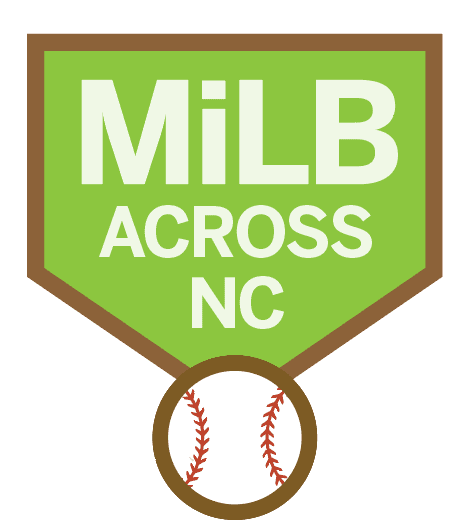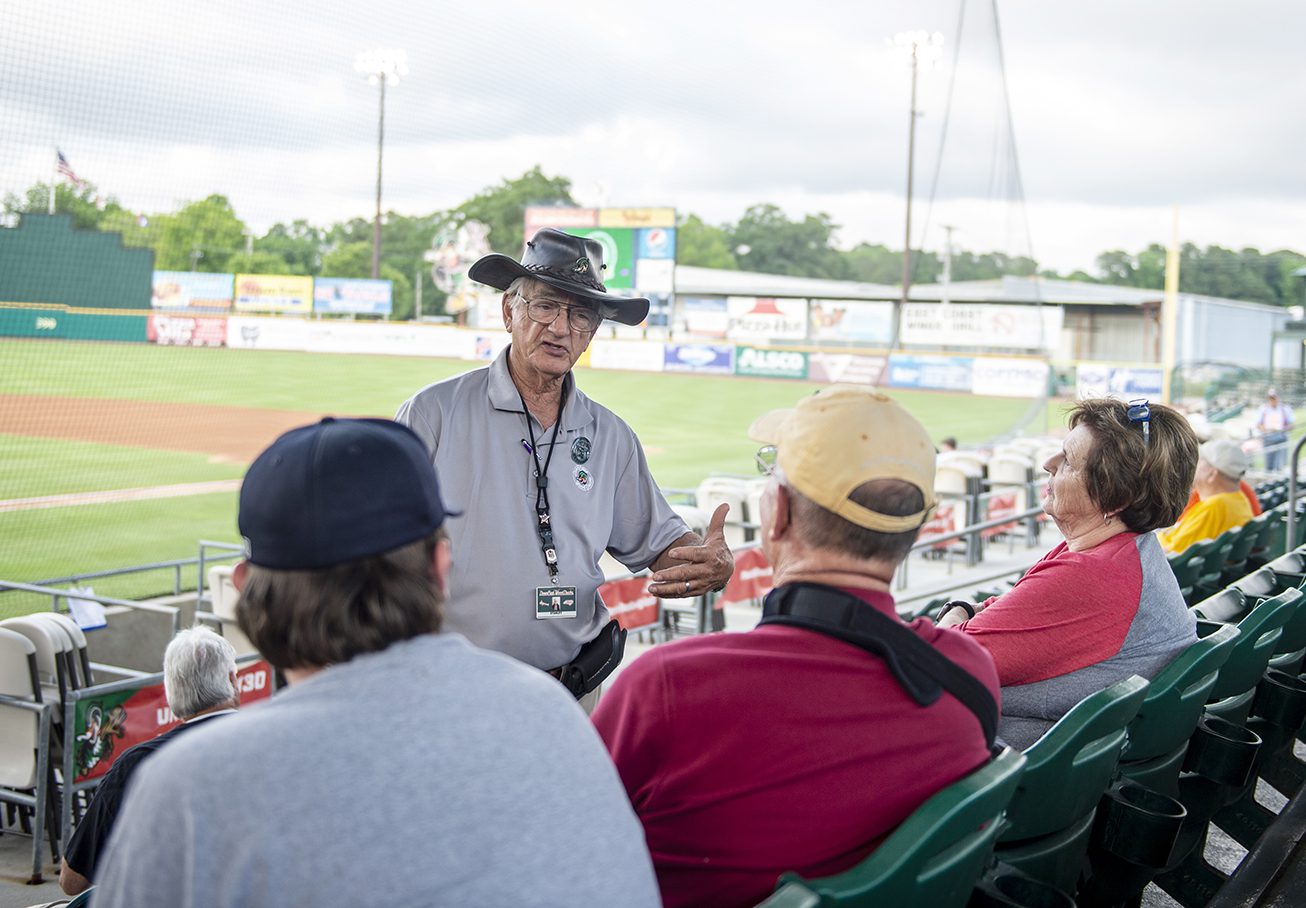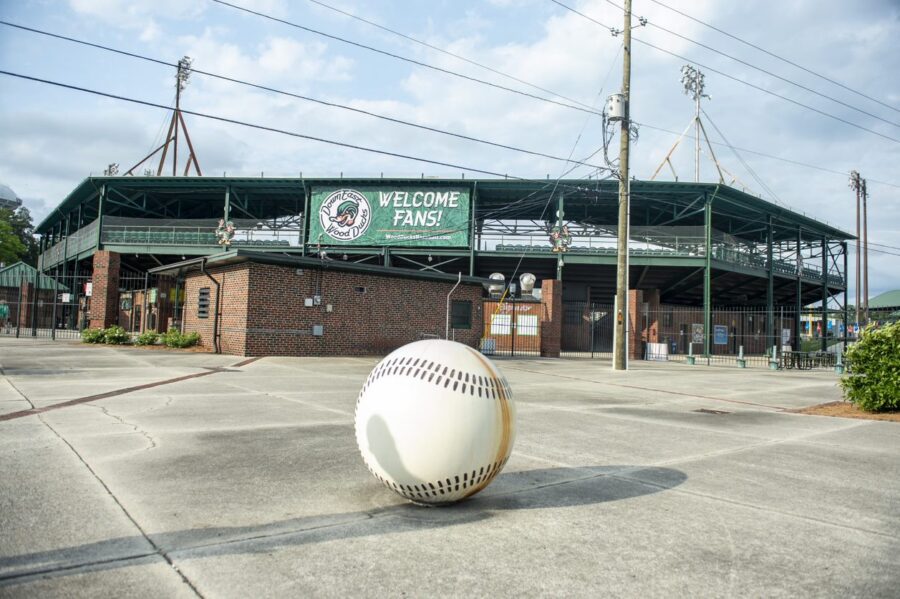
KINSTON — Stanley Sullivan isn’t just an usher for the Down East Wood Ducks. He’s also the Carolina League team’s unofficial goodwill ambassador.
 A fixture at historic Grainger Stadium since 2000, the 79-year-old Air Force veteran roams the stands before and during games interacting with fans in his trademark leather cowboy hat and ever-present smile, along with the authentic Texas Rangers badge he recently acquired.
A fixture at historic Grainger Stadium since 2000, the 79-year-old Air Force veteran roams the stands before and during games interacting with fans in his trademark leather cowboy hat and ever-present smile, along with the authentic Texas Rangers badge he recently acquired.
He knows most of the regulars by name and strangers rarely stay strangers for long.
It’s a personable approach that permeates throughout the Wood Ducks’ organization, one that closely mirrors the identity of their tight-knit, resilient community better than most in minor league baseball.
“Kinston is a blue-collar, working-class town, and this team is something everyone has in common,” Sullivan said before a game against the Fayetteville Woodpeckers last week. “There’s a lot of history here. The entire community gets involved. People have been coming here for generation after generation, and when they do, they feel like they’re right at home.”
The stadium in which the Wood Ducks play has a lot to do with creating that feeling of comfort and familiarity.
It’s not a shiny state-of-the-art baseball palace like those in Fayetteville or Zebulon, home of another in-state league rival, the Carolina Mudcats. There are no luxury boxes or any of the other bells and whistles to enhance the fan experience.

It’s a classic old ballpark with a covered grandstand, 4,100 green seats and an outfield wall plastered from foul pole to foul pole with local advertising. Other than a few recent enhancements, including a right field beer garden and party deck sponsored by Kinston’s Mother Earth Brewery, an empty seat honoring local POW/MIAs and signs all around the concourse providing fun facts about actual wood ducks, the place looks very much like it did the day it first opened its gates back in 1949.
While other teams hold Throwback Thursday promotions to celebrate the good old days with their fans, every Wood Ducks home game at Grainger Stadium has the feel of a nostalgic trip to a bygone era.
“Everybody always says ‘Historic Grainger Stadium,’ and when I first got here I was like, ‘What historic events did we host here?’ just trying to get my bearing straight when it came up,” said Wade Howell, an Atlanta native who holds the title of team vice president. “But it’s not like that. It’s just a place that has stood the test of time.
“It’s a tough little stadium that just like Kinston has been counted out multiple times, but it keeps hanging on and improving with the times.”
There’s still work that needs to be done to bring Grainger up to the minimum standards set when Major League Baseball took control of the minor leagues in 2020. Among them are new clubhouses, adequate facilities for female personnel and a second covered batting cage.
None of that, however, will affect the look and feel that give the old park its charm.
That’s good news to Ellen Wood of nearby Beulaville, a season ticket holder who has been coming to games at Grainger since the Wood Ducks’ predecessor, the Kinston Indians, played there.
She calls her preferred location in front of the picnic area down the right field line “the best seats in the house” because they’re so close to the action and beyond the reach of the safety netting that protects the main grandstand. The only drawback is that she has to look into the sun for the first couple of innings.
“It’s not that big a deal,” she said, flashing the game program she uses to shield her eyes. “It goes behind the roof by 7:20. To me, you can’t get any better than this.”

The fact that Wood and her fellow fans still have a place to come watch games on muggy summer nights is a tribute to former Kinston mayor B.J. Murphy, parks and recreation director Bill Ellis, former city manager Tony Sears and former team owner Cam McRae.
The four civic leaders helped lead an effort to keep Grainger Stadium from falling into disrepair while they attempted to bring affiliated professional baseball back after the Indians left town in 2011.
It was no small task considering that, with a population of about 22,000, Kinston is the smallest market in all the minor leagues.
Their commitment eventually paid off in 2017 when the Texas Rangers, lured by the groundswell of local support and a move-in ready stadium, decided to relocate their Class A farm team from Victorville, California, to the banks of the Neuse River.
“Bill Ellis wanted to get another pro team here, and he made it his personal goal to make it happen,” said Bryan Hanks, a local radio personality who doubles as the Grainger Stadium public address announcer. “We had opportunities to get a partial season team or a college wood bat league team, but Bill didn’t want to settle for that.”
Unlike Kinston’s previous minor league entries, the Wood Ducks aren’t locally owned. The franchise belongs to its parent club, the Texas Rangers.
But they’re anything but absentee owners.
Not only have they made a long-term commitment, signing a 12-year contract with the city, but in an effort to get to know the true measure of the community, Howell moved to the area, lived among the fans and got involved in civic issues.
“You just kind of dive in, talk to business owners and sponsors, talk to the Chamber of Commerce and learn what’s going on,” he said, noting that he grew up in a small town similar to Kinston. “We got embraced really easily because baseball had been gone for five years.
“I don’t think they necessarily think about the economic impact, which at like $2.3 million is huge, but we do. They’re just happy to have baseball back.”
Even though Howell moved away in 2019 when he was also put in charge of the Hickory Crawdads, the Rangers’ other North Carolina-based farm team, the Wood Ducks continue to have a local connection thanks to the leadership of energetic young general manager Jon Clemmons, an NC State graduate from the Down East town of Swansboro.
They’re also blessed to have an army of sponsors, volunteers and team employees — including one genial usher named Stanley — who continue to make everyone that comes to the old ballpark feel right at home.
Read NSJ’s 2022 MiLB Across NC features: Carolina Mudcats • Winston-Salem Dash • Kannapolis Cannon Ballers • Greensboro Grasshoppers • Fayetteville Woodpeckers • Charlotte Knights • Durham Bulls • Hickory Crawdads • Asheville Tourists



